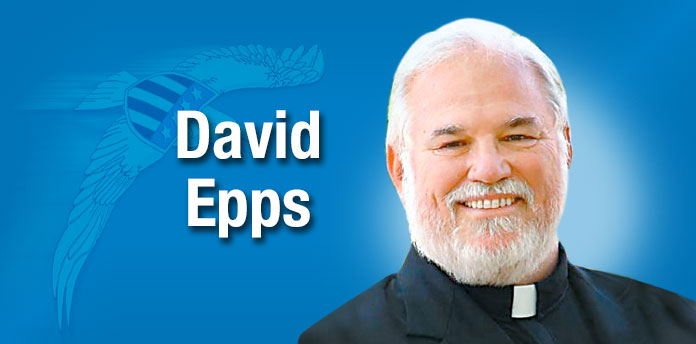I saw a meme on social media that asked and answered a question: “What does a bishop do? It moves diagonally.” If one has ever played chess, one will recognize that the bishop, one of the pieces on the board, does, indeed move diagonally.
Sometimes the question is asked, not in reference to chess, but to the biblical and ecclesiastical office of bishop. The answer to that question of, “What does a bishop do?” is more complicated.
It has now been 14 years since I was elected and consecrated as a bishop in my communion, or denomination, and some days I am still trying to find the answer to that question. The answer also depends on which church or communion the bishop serves with. Not all bishops in all denominations do the same things.
In a few denominations, the term “bishop” is used in lieu of the term, “pastor.” So, a bishop is the senior pastor of that one church. In other denominations, the bishop oversees huge geographical areas with many, perhaps, hundreds, of local congregations. Quite a few denominations, and some so-called “non-denominations,” have bishops and what they do is as varied as the number of denominations that have them.
Some Pentecostal and charismatic denominations have bishops, as do a number of Protestant denominations (including evangelical organizations), and nearly all liturgical/sacramental denominations recognize the office and ministry of bishops. And, of course, there are always those around that just bestow the title on themselves or have friends do it for them. If it sounds confusing, it certainly can be.
So, I will narrow the focus and just try to describe, in a nutshell, what I have learned that I am to do over the past 14 years.
While in most denominations, a bishop is a full-time position that does not include serving as the pastor of a church, ours is different. In fact, to be the bishop of a diocese, he must be an active pastor of a church and continue to be a church pastor during his career. So, I am the bishop of Georgia and Tennessee, but I am first of all the pastor of a church. If I give up being a pastor (or “rector”) I cannot continue to be the bishop of my area.
This has advantages. One is that it keeps the bishop tied to the real-life needs of churches and congregation members. It does not allow them to have an ivory tower mentality and only breathe the rarified air separated from the reality of real people.
I still preach sermons, baptize people, teach, visit the sick, am available to any and every member of the congregation, work with a church council, marry people, bury the dead, comfort people in their bereavement, and am a part of the lives of everyday church folks. Everyone in my congregation has my cell phone number. In fact, being a pastor is my first and most important ministry. I am the spiritual “father” of a local church family.
I am also a spiritual father to the other “fathers,” or ordained clergy, in my church and diocese. I visit with them, serve as a sounding board or a counselor when needed, offer prayer for them always, recognize their accomplishments, encourage them during the tough times, support them in their hopes and dreams, serve as a mentor and (hopefully) a positive example, and, when necessary, offer advice and correction, and (much less often) rebuke and chastisement.
In my case, I meet with the Bishop’s Council, which in our diocese, consists of all the pastors (rectors and vicars) and a few other specialists. Together, in consensus, we govern the affairs of the diocese. I also, if circumstances permit, visit each church at least once a year where I am in charge of that service. In my world, the bishop is the pastor of all the churches in the diocese and sits, if he so chooses, on every church’s governing council. The priests and deacons are the delegated authorities that serve the members of their churches.
Two of the enjoyable tasks are performing ordinations and confirmations, both of which are vital to the continuation of the church into the future. Others are the setting in order of new churches and the installation of clergy and pastors to their new ministries.
An unpleasant task, fortunately a rare one, is the deposition, or “defrocking” of a priest or deacon and expulsion from the ministry for cause. I also try to stay connected with retired or disabled clergy and with the widows of clergy and with clergy who have lost their wives.
I should mention that most of our bishops do not receive much of a salary for being a diocesan bishop. If they receive anything. I personally do not receive a salary at all from the diocese, although most of my expenses for “bishop work” is covered. Thus, it is a “volunteer” position with lots of responsibilities and few temporal rewards. Still, it is an honor to serve. And that is what being a bishop is — a servant.
Sometimes, people forget that fact, but, for a deacon, priest, or bishop, it is a dangerous fact to forget. I have met bishops who thought of themselves as rulers who deserved and insisted on compliance, on being honored, and on being served. Jesus said he came among us as “one who serves,” and he is the only legitimate role model for any level of clergy.
I also have the privilege and responsibility of serving as the associate endorser for our denomination’s military chaplains. Prior to the pandemic, I visited our chaplains on their military bases and sought how I could support and assist them in their vital ministry. In the coming year, now that restrictions are lifting, I plan to make a number of visits to those who serve as spiritual fathers to our soldiers, sailors, airmen, and Marines.
As a bishop, I meet twice a year for about a week with our North American House of Bishops and meet four times a year with my fellow bishops in the South. This latter group is especially important for me as it is more of a spiritual time of refreshment and renewal than it is a meeting for business.
This is not a comprehensive explanation by any means and sometimes situations crop up that are unique and unexpected. In chess, a pawn moves only forward, while a knight moves in an “L-shape” pattern. A castle moves forward, backward, and to the side while a king can move one space at a time in any direction. The queen is the most powerful and can move in any direction except for the “L-shape” pattern. The bishop moves diagonally. Other than the pawn, he may be the weakest piece on the board. But when he is needed, it is important that he be in play. He certainly is not the most important piece.
The most important piece is the king. Everything in chess revolves around the king. The power piece is the queen, although her role is to protect the king. In the Christian faith, the King is Christ. Everything is about him. The Queen, in my view, is the Church who is the King’s most valuable asset. The bishop? Well, he serves the king, protects the queen, and has a role that the other minor pieces do not have. As long as the bishop, who moves diagonally, is used properly, and his moves are not haphazard or squandered, the chances of success are enhanced. Both in a game of chess and in the life of the Church.
[David Epps is the Rector of the Cathedral of Christ the King (www.ctk.life). During the pandemic, the church is open at 10:00 a.m. on Sundays but is also live streaming at www.ctk.life. He is the bishop of the Diocese of the Mid-South (www.midsouthdiocese.life) He may contacted at [email protected].]












Leave a Comment
You must be logged in to post a comment.